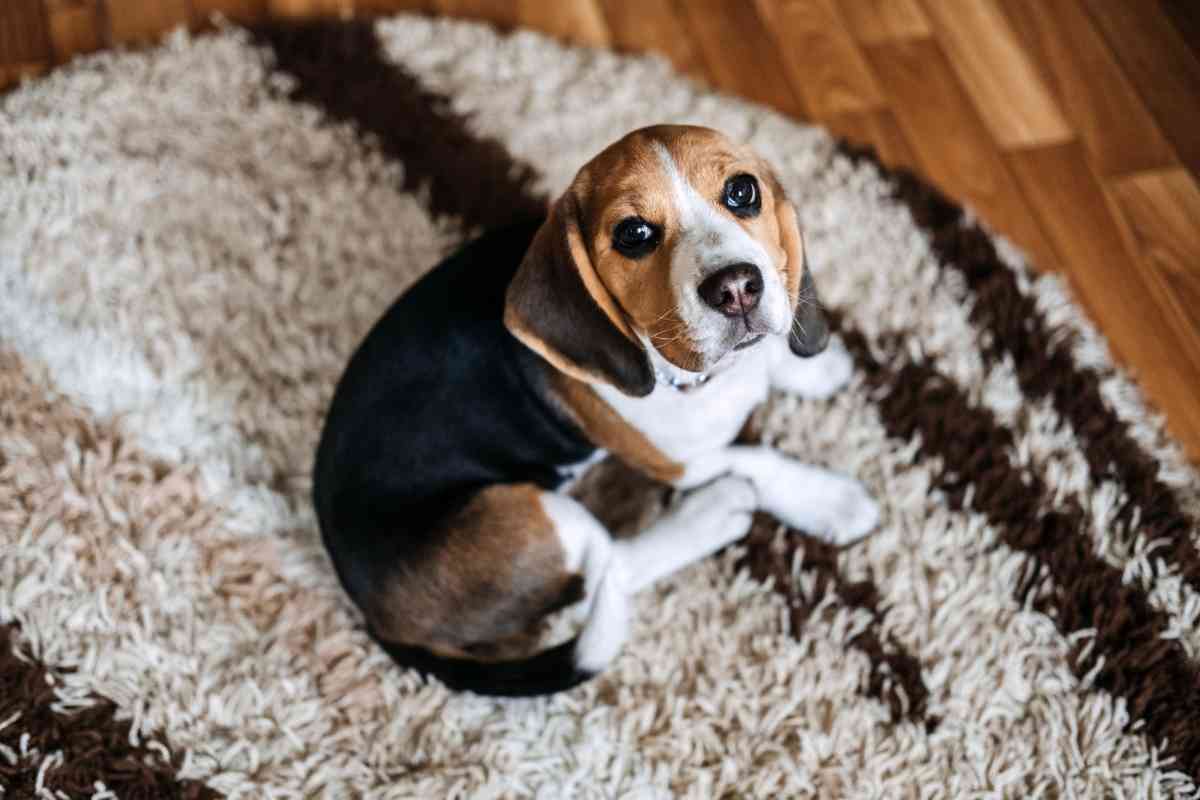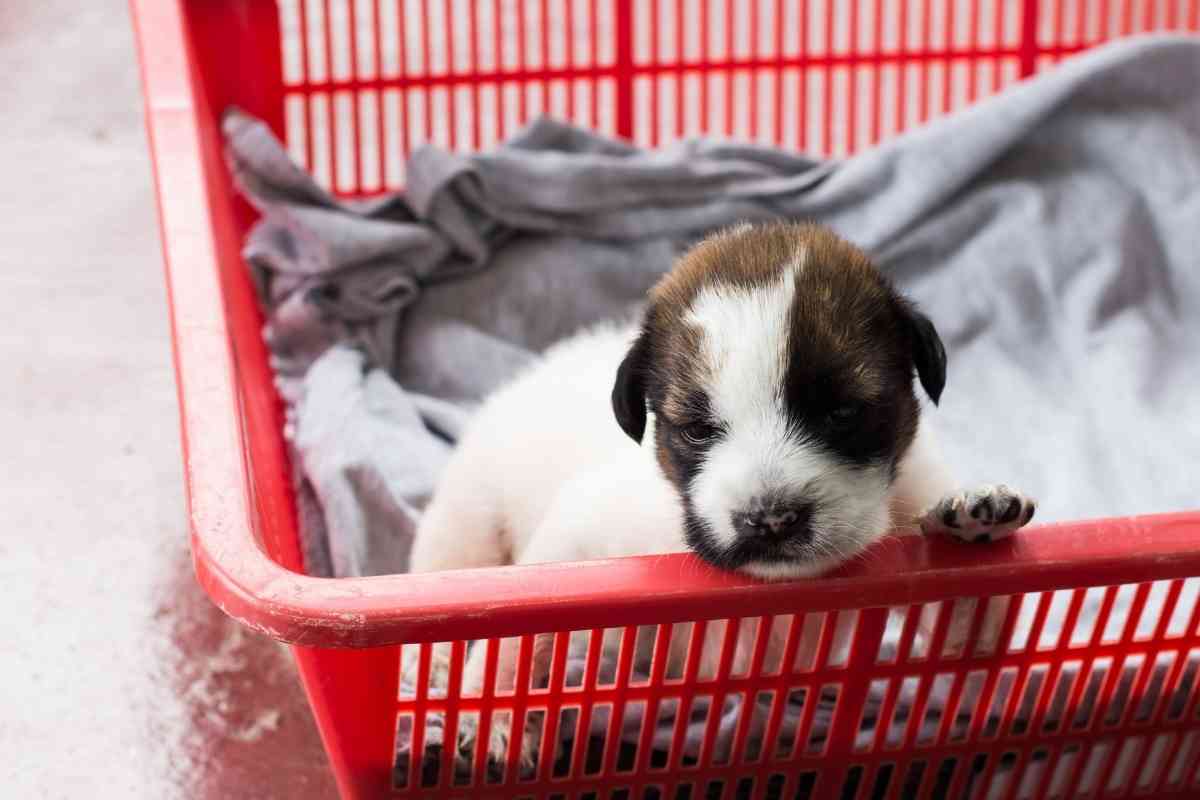7 Reasons Your Puppy Is Having Diarrhea At Night
Your puppy’s health is crucial, and it can be an uncomfortable period for everyone when the puppy is sick. So, why does my puppy have diarrhea at night? Diarrhea is uncomfortable as it’s uncontrollable and can have your puppy pooping anywhere in the house. You can tell your puppy is having diarrhea when you notice they pooping watery stool. Their rate of pooping also increases, and most of the time, you find that they are straining to poop and that their poop sometimes contains mucus of blood. And the worst part is most often; you’ll find your puppy having diarrhea at night.

Why does my puppy have diarrhea overnight?
Your puppy may have diarrhea at night because of changes in their diet, food intolerance & diseases, feeding on spoilt food, allergies, medication, or parasitic infestation. If you notice they are not getting well even after the home intervention, take them to the vet for treatment.
Before rushing your puppy to the dog, find out if you’ve introduced new things in his life, from food and toys. If you have also brought home a new pet, it may be the reason your puppy is experiencing significant stress or anxiety over sharing space and your attention. Try to address all these factors; if none work, you can take your puppy to the vet.
Always be careful with your dog’s food and the environment they play in, as they can easily collect dirt and feed on bad food.
Also, ensure that you are taking your puppy for regular vet checks, and whenever you bring a new pet home, ensure you get them acquainted before leaving them in the house together
Reasons Why Your Puppy has Diarrhea at Night
These are some of the reasons why your puppy might be having diarrhea.
Medication
If your puppy is sick, chances are you’ve been prescribed medication for their treatment. These medicines might be the reason your dog has diarrhea at night. Some medications that cause diarrhea include dewormers, observed even in humans. This will take a few days until your dog’s body is rid of all worms.
Every time the vet prescribes medicine for your puppy, discuss their side effects so you know what to expect.
Stress or Anxiety
Our puppies are susceptible to changes in their environment, so their bodies respond by having diarrhea when they experience a stressful moment or have anxieties. So when you bring a puppy home from the breeders, be sure that for the next few days, your puppy might experience diarrhea as they adjust to their new home.
Or, when you bring home a new pet, they might face the stress of having to share their space and your attention. Therefore, they might appear to be clingy and sometimes to the point of wanting to sleep with you.
So, take time and introduce your new pet to your puppy; sometimes, you can spoil them by sleeping with you on the bed.
Pinpointing the source of their stress and anxiety will help you help them improve their digestive system.
Spoilt Food
While out playing or taking a walk, your dog might have picked up food from the garbage, which is contaminated, thus the reason why they have an upset stomach.
Change of Food
It is common for dogs to experience food allergies before their owner can know exactly what to feed them. So do not panic if you have recently introduced new food or treats to their diet. When exploring food, ensure that you don’t provide them multiple products, only single products, as it will help you identify what foods they are allergic to.
Although dogs feed on human foods, some don’t go well with their digestive system. So, when introducing a new diet, ensure it’s done in the morning and not at night to avoid or minimize nighttime diarrhea.
Ailments
Your puppy may be having diarrhea at night because they are ill. Some diseases that can cause diarrhea include cancer, Inflammatory Bowel Syndrome, Colitis, and liver or kidney disease.
Parasites
Night-time diarrhea in your puppy might also be caused by parasitic infestation in the intestines. Your pup’s drinking water may be infested by parasites, such as hookworms, giardia, roundworms, or Coccidia. These parasites weaken your puppy’s body, causing explosive dog diarrhea.
Your dog may have eaten raw meat or contaminated food. And this can expose them to various bacteria and viruses, including salmonella, parvoviruses, or clostridia, which cause nighttime diarrhea.

Inflammatory Bowel Disease
This is a condition where your puppy’s gastrointestinal tract becomes inflamed due to underlying health conditions or bacteria and parasitic infection.
When the digestive tract is inflamed, it inhibits your puppy’s digestion and absorption of nutrients, taking a toll on their body. This leads to your dog having diarrhea at night, and the poop has blood or mucus.
The minute you see mucus or blood in your puppy’s stool, consult your vet immediately.
Ways to Ensure Your Dog Doesn’t Experience Diarrhea at Night
We all want our puppies to be healthy and comfortable. So, it would be best if you did everything possible to prevent them from experiencing diarrhea, irrespective of the time of the day. You can do so by following these tips.
- Note your dog’s bathroom pattern, especially if they poop outside. This is because you won’t have a chance to look at their poop closely. If you notice that they want to be let out more often, they might have colitis.
- Always consults your vet before feeding your dog any medication. And when buying over-the-counter medication, always read the packaging to understand the side effects.
- After noticing that they have diarrhea, withhold food for 12 hours. This will give them time to clear off everything in their intestines and allow their stomach to rest.
- Then introduce them to a simple diet after the rest. Start with a soft, bland diet, such as plain rice and cooked chicken. Feed your puppy in small portions and frequently. And once you notice that their poop is back to normal, you can return to your regular feeding schedule. And remember to add treats to their meals.
- Ensure your dog is on a monthly heartworm or tick preventative schedule. This helps prevent parasite infestation and protects them from getting heartworm disease. These medications also contain dewormers to protect your puppy from intestinal worms.
- Always ensure your puppy is happy and doesn’t experience any stressful situations.
- Feed your dogs food that will help soothe their upset stomach. These include natural yogurt, white rice probiotics, cottage cheese, or peeled boiled potatoes. You can also feed them herbs such as fennel or specially formulated dog food for the digestive system.
Don’t Do the Following if You Don’t Your Puppy Having Diarrhea
If you don’t want to see your puppy uncomfortable because of diarrhea, don’t do the following.
Don’t Let Them Outside Without Supervision
Puppies are curious by nature, and if you let them outside without company, they might consume everything that seems edible, from the soil, feces, dead animals & leaves, and drink stagnant water.
All these will be why you’ll have sleepless nights as your dog might become ill, and diarrhea will be the least of your problems. So, always accompany your puppy when going outside.
Don’t Introduce New Food Suddenly
Do not change your pet’s diet suddenly; introduce new food slowly over two weeks. This will give their digestive system time to get used to the new diet. Thus, minimizing the chances of nighttime diarrhea.
Don’t wait too long before Seeking help
If you notice that your puppy has diarrhea, try and take home measures, but if they take longer to work, it would be best to seek help from your veterinarian. Early treatment helps prevent worst-case scenarios.
When Should You Visit Your Vet?
It’s normal for your dog to have diarrhea for one day, but if it goes on for several days, there might be a problem.
If the stool is watery and clear, their gastrointestinal tract might be experiencing blockage because your puppy ingested a toy. And for this, you must take your dog to the vet for treatment and be prepared, as surgery might be the only solution.
If your puppy has diarrhea during the day, it might be because of a severe health problem, so seek your vet’s advice.
Other symptoms of diarrhea that will have you schedule a vet visit is if your puppy:
- Shows signs of weakness
- There is blood or mucus in the poop
- Vomiting
- Reduced appetite
- Dehydration
- Excessive drooling